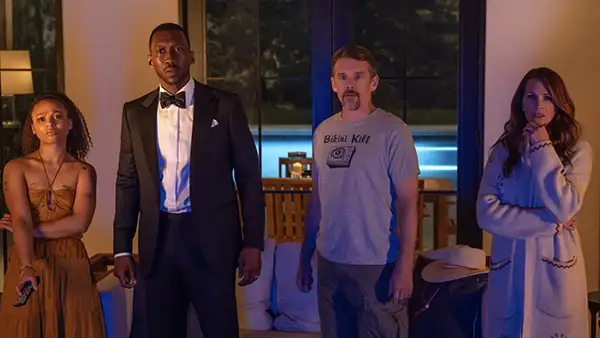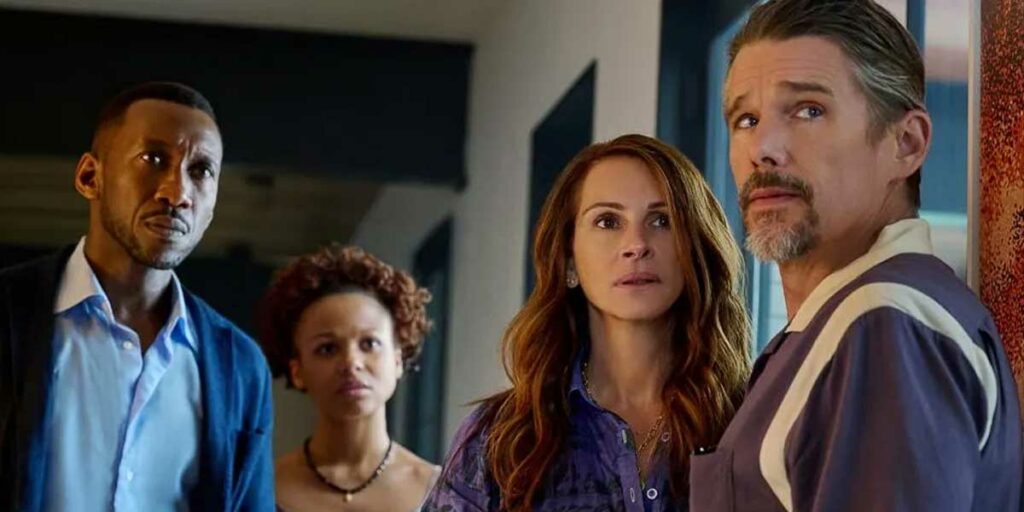Netflix’s Leave the World Behind foreshadows a modern-age apocalypse that might be faulty and bizarrely depicted but has terrifyingly sizable odds in its favor.
Sam Esmail loves his digital apocalypse thrillers. We saw it in his brilliant mind-bending series Mr. Robot, which propelled him into stardom, and, now, in his return to the big screen in Netflix’s Leave the World Behind. The film wrestles with similar themes, surrounding society’s impending doom made by our own hands. This time, however, Esmail examines with a magnifying glass a particular wealth class and a few of its representatives as they come to terms with their lives’ fragility and codependencies.
Julia Roberts and Ethan Hawke play Amanda and Clay, a married couple in desperate need of a vacation from their overwhelming work lives. With their two children, Rose (Farrah Mackenzie) and Archie (Charlie Evans), they drive to a beautiful rental home away from the city for a weekend. Their peace is disturbed on the first night when technologies start malfunctioning and two strangers, a father (Mahershala Ali) and a daughter (Myha’la Herrold), knock on the door, claiming the house is theirs. Catastrophic events begin to raise questions as the characters’ sense of safety gets quickly swept from under them.
What seems like a typical doomsday scenario turns out to be something way scarier because of its tangible possibility. Based on the novel of the same name, Leave the World Behind shows us that, in our day and age, there’s a new type of apocalypse that should be added to the list of ways the world could end, evolving from our extreme reliance on technology: a digital apocalypse.
The message is clear and delivered with the alarming uneasiness that it requires. Esmail has evidently mastered his way of transfixing the viewer with this subject matter and awakening our ignored awareness of how dangerously deep we’ve sunk into digital comfort.
Besides that, I can’t help but feel confused and conflicted. When I look at Leave the World Behind in its entirety rather than at individual components, I don’t see as polished of a story as I wanted.
From a technical standpoint, I had minor eyebrow-raising moments at some of the music choices in the first half, jumping between styles sometimes right after one another, all equally intense and in your face. It’s something that I could’ve easily overlooked if it was the only problem, but let’s look deeper.

There is an abundance of clever camerawork and stunning visuals, especially in one particular car sequence, which is brilliantly executed. Some of the unique angles that make the film stand out feel purposeful (such as aerial tracking shots from above that create the feeling of observing humanity from a non-human POV), but some others feel like they are for dramatic effect, which only results in distracting from the tension.
Where I really start losing grip on the movie is the screenplay itself and the way the story is handled through the characters. I can’t look past the one-dimensionality of how the characters are presented and consistently stick to their labels throughout the entire film.
The strangers that arrive are George ‘G.H.’, the neutral enigma who knows more than he lets on, and his daughter Ruth, the judgmental representative of Gen Z. Amanda is the skeptic. Clay is the optimist in the family. Rosie is obsessed with a sitcom. Archie is an aroused teenager all the time. At one point, a situation becomes extremely dangerous for Archie, and his mind is somehow still occupied by this one girl who sent him a bikini picture while on the beach and whether she is still alive. Over-dramaticized caricature traits are characteristic of satirical comedy, while everything else points at the film trying to be a mystery thriller.
It’s quite evident how the writing keeps information from the viewer for longer than necessary just for the sake of keeping the mystery going and keeping us guessing. The thing with effective mystery is that you don’t want it to feel orchestrated: you don’t want to feel the writer or director intentionally denying you access or omitting information. The mystery should feel like it’s lurking more organically and subtly in order to be effective.
Conceptually flawed and underdeveloped, Leave the World Behind bets on the power of an intimate character study as a method of exploring a global crisis issue, but instead, it ends up tackling it halfway in an underwhelming final act resolution.
One of the few scenes that feel like they contribute something new to the conversation the movie tries to stir is the conversation about people in power between G.H. (Ali) and Amanda (Roberts): the fear of no one being in control, and that being the scariest apocalypse there is. Otherwise, it’s just confused upper-class people desperately trying to maintain their sense of normalcy as the world is crumbling around them.
Leave the World Behind is stunning to look at, with some scary commentary on how we continue to doom ourselves through our hyperfixations and indulgences that end up making us feel more disconnected than ever, but it fails to flesh out any of the ideas it throws at the wall. I felt utterly terrified at the accuracy of some scenes, and in others, I felt continuously surprised at how off the rails this story got.
The film builds up to a series of reveals way too late into its runtime and decides to wrap up everything in an ending that makes me consider this more of a satire than anything else. It didn’t feel like that was the supposed intention, so my constant back and forth between heightened anxiety and confused chuckling left me in the middle, feeling neither, as the screen went black.
Leave the World Behind is now available to watch on Netflix.

